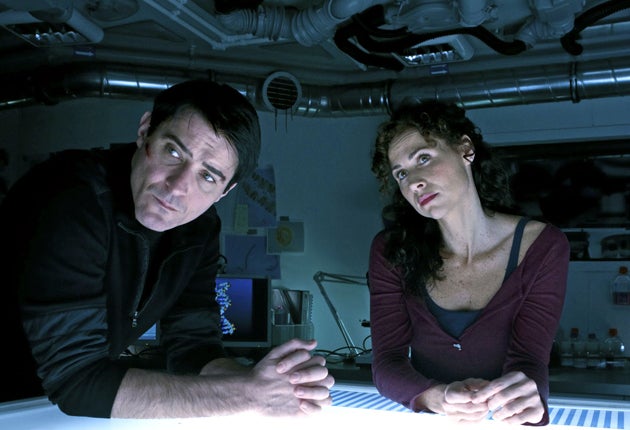The Deep, BBC1<br/>Sherlock, BBC1
The action aboard the 'Orpheus' chugs along nicely and with some decent effects– just watch out for Cap'n Minnie

Your support helps us to tell the story
From reproductive rights to climate change to Big Tech, The Independent is on the ground when the story is developing. Whether it's investigating the financials of Elon Musk's pro-Trump PAC or producing our latest documentary, 'The A Word', which shines a light on the American women fighting for reproductive rights, we know how important it is to parse out the facts from the messaging.
At such a critical moment in US history, we need reporters on the ground. Your donation allows us to keep sending journalists to speak to both sides of the story.
The Independent is trusted by Americans across the entire political spectrum. And unlike many other quality news outlets, we choose not to lock Americans out of our reporting and analysis with paywalls. We believe quality journalism should be available to everyone, paid for by those who can afford it.
Your support makes all the difference.Minnie Driver, submarine captain – four words I suspect you never thought you'd read in succession.
But in its efforts to provide a few oases in the desert of the August telly schedules, the BBC ought to be given its head. In the case of The Deep, its five-part action thriller, you might even say it has a blockbuster on its hands: it's got James Nesbitt as engineer Clem Donnelly and that dishy Euro-doctor from ER, Goran Visnjic as marine biologist Samson Ungliss. Which is a lot of grizzled eyebrow-wagging in a confined space several kilometres beneath the North Pole.
Fetchingly kitted out in Melton sweaters and roll-necks, Captain Frances Kelly (Minnie) and her crew of scientists are off to rummage about polar thermal vents in search of some wonder mineral that promises to provide endless energy for the planet. The plot has to make to do with baser material, standard Hollywood boilerplate. Clem's wife disappeared on a similar mission, and the sub's name, Orpheus, tells you all you need to know about where that thread is going. There's lots of breezy guff about the "engines of existence", "Elysian vent fields", and a salvage man aboard who may as well get out his clipboard marked Treacherous Ulterior Motives. The action, though, chugs along nicely, with some decent effects, if you squint a bit.
But never mind all that. Cap'*Kelly is just, like, sooo not having a good time on the bridge, yeah? The skipper is in the midst of an affair with Samson, and the scene in which she is confronted on the phone by his wife as the Orpheus dives beneath the Atlantic holds out the hope that when their air runs out, the crew can switch to their supply of pure camp.
(At this point, I had planned to segue smoothly into the week's other marine fun on the BBC, Wild Swimming with Alice Roberts, but, after an undignified tussle, my colleague Andrew Tong won the honour of writing about skinny-dipping in chilly ponds. See his review in Sport, page 22).
Now, who, save the genius himself, can solve the conundrum of Sherlock? The opening episode a couple of weeks ago was everything you might have hoped for from a dream team consisting of Steven Moffat, Mark Gatiss and Arthur Conan Doyle. Pacy, tense, witty, effortlessly contemporary, and with its own instantly engaging visual style – texts, emails, thoughts bursting out of Benedict Cumberbatch's throbbing lobes to float before us.
And all the more dazzling, for me at least, because I saw it after watching the second episode last Sunday, which came on like a hangover after the party of the week before. The premise of "The Blind Banker" had Holmes pitted against the dastardly Black Lotus, a crew of Chinese smugglers whose old-fashioned menace was straightforward Yellow Peril, with a dash of Saturday morning matinee lighting. Blood was spilt, conspiracies thickened; so far, so good.
Yet while Holmes toiled, trying to crack the cipher by which the Black Lotus communicate with their associates, Martin Freeman as Doctor Watson went off to get a job and a girlfriend. As for Rupert Graves's Inspector Lestrade – he failed to turn up at all.
Perhaps this was the problem. The joy of episode one, "A Study in Pink", was this trio standing in 221B Baker Street, thrown together by circumstance, and not having a clue what was going on in one another's heads. But in episode two, with Lestrade gone and Watson off starring in some romcom subplot, that relationship drama fizzled away. Worse, Holmes began to look like the thoroughly unlikeable crazed loner just about everyone except Watson believes him to be. And why is it that any drama that tries to include a graffiti artist ends up with spray paint all over its face?
One hesitates to tempt fortune, but Paul McGuigan, the director who brought such zip to the series opener, is back at the helm for tonight's concluding episode. So let's hope Sherlock gets the finale that it deserves.
Join our commenting forum
Join thought-provoking conversations, follow other Independent readers and see their replies
Comments